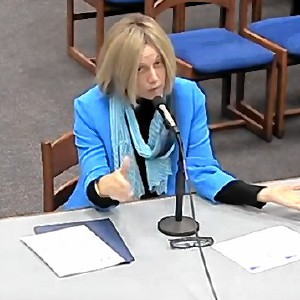Plan advances to overhaul nuisance property bylaw in Amherst

Amherst Town Hall STAFF PHOTO/DAN LITTLE
| Published: 03-14-2024 3:05 PM |
AMHERST — Town officials would be empowered to work with property owners to coordinate corrective action plans when their properties receive three nuisance property infractions in a year under a revised nuisance property bylaw being proposed.
The revised bylaw, however, does not include a provision to suspend or revoke rental permits or prevent people from renewing these permits.
The Community Resources Committee recently completed its work on overhauling the nuisance house bylaw, adopted in 2008, which would be rescinded and replaced with a nuisance property bylaw. The work on the nuisance property bylaw has coincided with efforts to change the rental permitting program, mandating inspections that would replace a system that depends on self-certification.
The new nuisance property bylaw would continue to allow fines of up to $300 to be levied by police officers and inspection service employees to deal with recurrent issues in the college town, commonly large gatherings of college-age people where alcohol is being provided to underage individuals, as well as public urination, public fights, littering and illegal noise. The bylaw also covers other potential problems, such as junk vehicles and failure to remove snow and ice from sidewalks.
In advance of the Town Council taking up the measure, a final consideration was whether the bylaw should allow for the revocation of rental permits, a consequence that At Large Councilor Mandi Jo Hanneke disagreed with.
Speaking at the committee meeting on Feb. 27, Hanneke said the town already has procedures to bring property owners in to talk and that the rental registration bylaw provides that inspections can occur more frequently if a location is designated a nuisance property.
“Those two together are the most appropriate actions for nuisance properties, but suspending or revoking a rental permit seems too harsh to me,” Hanneke said.
“Loss of rental permit would only ever apply to a subset of property owners,” Hanneke said. “I think that’s the other thing that sits wrong with me: We’re writing into a bylaw something that doesn’t apply equally to all members of the status of property owner in this town.”
Article continues after...
Yesterday's Most Read Articles
 Next 5-story building cleared to rise in downtown Amherst
Next 5-story building cleared to rise in downtown Amherst
 Susan Tracy: Support Ukraine funding
Susan Tracy: Support Ukraine funding
 Don Michak: Dig deeper after scandalous court ruling in Soldiers' Home case
Don Michak: Dig deeper after scandalous court ruling in Soldiers' Home case
 Jack Tullos: UMass gets a Big MAC
Jack Tullos: UMass gets a Big MAC
 Amherst regional superintendent candidate stresses inclusion, broad expertise
Amherst regional superintendent candidate stresses inclusion, broad expertise
 Frontier’s response to alleged sexual misconduct draws ire
Frontier’s response to alleged sexual misconduct draws ire
The correction process outlined in the bylaw gets a property owner to listen and to eventually work out the problems. “I cannot support this rewrite anymore if it’s got a loss of rental permit in it,” Hanneke said.
Hanneke was joined by District 2 Councilor Pat DeAngelis and District 1 Councilor Ndifreke Ette in removing that clause, while District 4 Councilors Jennifer Taub and Pamela Rooney voted to retain it.
Taub said a rental permit is like having a business license.
“It is a privilege to be able to have a rental permit and to rent property in town,” Taub said. If you are negligent according to our rules, then you might be suspended for six months or some period of time or, in some cases, not be able to renew or get a permit.”
The revised bylaw demands that property owners be involved in corrective actions and pay potential fines if they are not addressed. Taub said the potential loss of a rental permit is a powerful incentive for property owners to take required corrective actions so neighbors can live peacefully in their homes.
Rooney said it should never have to come to suspension or revocation of a license if corrective action has been taken. She worries that by eliminating this possibility, the new bylaw is less impactful.
“In my mind it feels like we have watered down this particular bylaw, even though we have added a whole slew of references to other bylaws and other forms of management,” Rooney said. “It does feel like we have taken the teeth out.”

 Gravel pit defenders in Granby make case
Gravel pit defenders in Granby make case Amherst council approves mandatory rental inspection program
Amherst council approves mandatory rental inspection program Amherst officials cool to bid to double spending hike for regional schools
Amherst officials cool to bid to double spending hike for regional schools